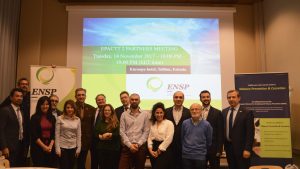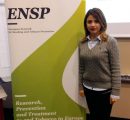
SPH at the European Network for Smoking and Tobacco Prevention Meeting
2 min read YEREVAN, Armenia – From November 13-15, American University of Armenia (AUA) Gerald and Patricia Turpanjian School of Public Health (SPH) Researcher Armine Abrahamyan (MPH ‘15) represented the SPH at the European Network for Smoking and Tobacco Prevention (ENSP) capacity building event in Tallinn, Estonia. Abrahamyan participated in the General Assembly of full ENSP members and in the annual EPACTT-2 (European Accredited Curriculum on Tobacco Treatment-2) meeting organized only for project partners. The goal of the EPACTT-2 project is to continue the development and expansion of an accredited curriculum for tobacco cessation in 15 European countries (Albania, Armenia, Belgium, Bulgaria, Georgia, Greece, Italy, Kosovo, Poland, Romania, Russia, Serbia, Slovenia, Spain, Ukraine) and to enhance the formulation of a network of healthcare professionals that will be dedicated to advancing evidence-based tobacco dependence treatment.
YEREVAN, Armenia – From November 13-15, American University of Armenia (AUA) Gerald and Patricia Turpanjian School of Public Health (SPH) Researcher Armine Abrahamyan (MPH ‘15) represented the SPH at the European Network for Smoking and Tobacco Prevention (ENSP) capacity building event in Tallinn, Estonia. Abrahamyan participated in the General Assembly of full ENSP members and in the annual EPACTT-2 (European Accredited Curriculum on Tobacco Treatment-2) meeting organized only for project partners. The goal of the EPACTT-2 project is to continue the development and expansion of an accredited curriculum for tobacco cessation in 15 European countries (Albania, Armenia, Belgium, Bulgaria, Georgia, Greece, Italy, Kosovo, Poland, Romania, Russia, Serbia, Slovenia, Spain, Ukraine) and to enhance the formulation of a network of healthcare professionals that will be dedicated to advancing evidence-based tobacco dependence treatment.
Every year, the ENSP organizes a network meeting for all its members as well as wider stakeholders, with the aim of providing delegates with updated information, practical tools and support for their tobacco control projects. The SPH became a full member in 2017.
The ENSP is an international non-profit organization whose mission is to develop a strategy for coordinated action among organizations working in tobacco control throughout Europe. The ENSP is comprised of member organizations from each of the 28 EU Member States plus Switzerland, Norway, Iceland, Georgia, Ukraine, and Russia. The ENSP has an observer status at the WHO Framework Convention on Tobacco Control (FCTC) and is perfectly positioned to enhance FCTC 14 activities and provides capacity and alliance building services to its members and other stakeholders.
The AUA School of Public Health works actively to improve population health and health services in Armenia and the region through interdisciplinary education and development of public health professionals to be leaders in public health, health services research and evaluation, and health care delivery and management.


